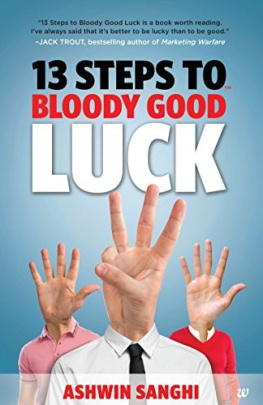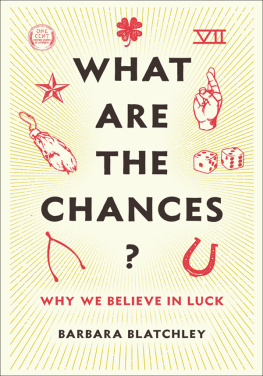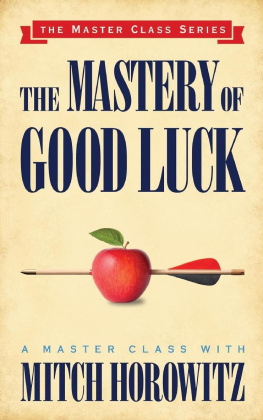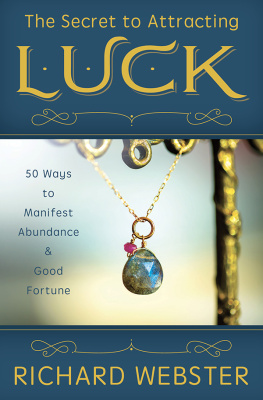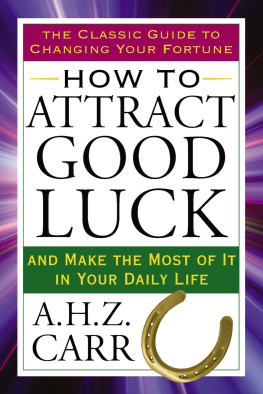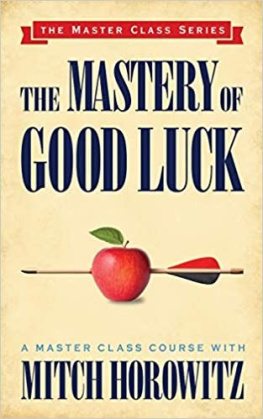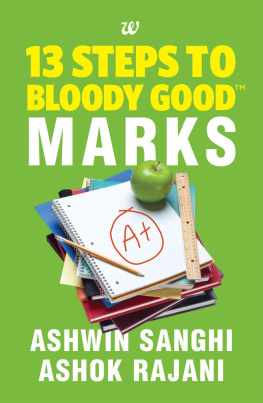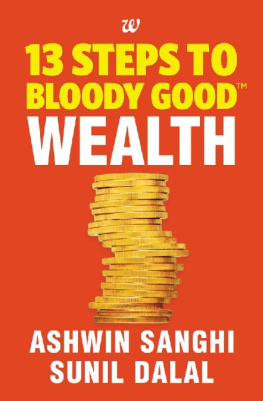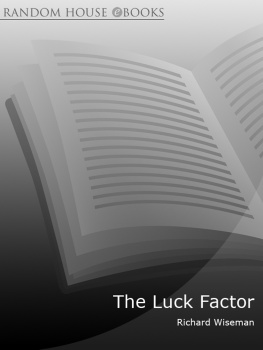westland ltd
13 Steps to Bloody Good Luck
Ashwin Sanghi is counted among Indias highest-selling English fiction authors. 13 Steps to Bloody Good Luck is his foray into the world of non-fiction.
Till date Ashwin has written three independent novels, all bestsellers, including The Rozabal Line , Chanakyas Chant and The Krishna Key . In addition he has co-authored a crime thriller, Private India , along with James Patterson, the worlds highest-selling writer.
Ashwins books have sold in lakhs and have been translated into many languages. Ashwin was included by Forbes India in their Celebrity India 100 Rankings and was recipient of the Crossword Popular Choice Award.
Ashwin was educated at the Cathedral and John Connon School, Mumbai, and St. Xaviers College, Mumbai. He also holds a Masters degree in business from Yale.
Ashwin lives in Mumbai with his wife Anushika and his son Raghuvir
More information about Ashwin at his website www.ashwinsanghi.com.
Westland Ltd
westland ltd
61, 2nd Floor, Silverline Building, Alapakkam Main Road, Maduravoyal, Chennai 600 095
No. 38/10 (New No.5), Raghava Nagar, New Timber Yard Layout, Bengaluru 560 026
93, 1st Floor, Sham Lal Road, Daryaganj, New Delhi 110 002
First ebook edition: 2014
First published by westland ltd, 2014
Copyright Ashwin Sanghi 2014
All rights reserved
ISBN: 978-93-84030-57-5
Typeset by PrePSol Enterprises Pvt. Ltd.
This book is sold subject to the condition that it shall not by way of trade or otherwise, be lent, resold, hired out, circulated, and no reproduction in any form, in whole or in part (except for brief quotations in critical articles or reviews) may be made without written permission of the publishers.
This little book is dedicated to my father, Mahendra Sanghi (the one who gave me the freedom to follow my dreams and shape
my own luck).
Contents
I
The Three Rs
Being a bestselling author is a wonderful feeling. My publisher loves me (almost unconditionally). My contracts get signed off (usually on my terms). My royalties allow me to live rather comfortably. At seminars, events and literature festivals, I am surrounded by readers and adoring fans. In that sense, I am an extremely lucky person.
But life wasnt quite always like that. I started writing my first novel at age thirty-six. Prior to that, I had not written anything longer than a couple of pages, not counting the extra-long answer sheets for my BA exams. (It was rumoured that examiners graded answer papers by weight.)
Three years later, when I was a bestselling author, many asked: Was it good luck or hard work?
I am a great believer in luck. The harder I work, the more of it I seem to have, wrote Coleman Cox, a business author. I have always wondered whether Mr Cox was right. What if there is no such thing as good luck? What if ones success is purely related to hard work? Looking back at my journey, it would be wonderful to attribute my success as a writer to hard work. Who wouldnt like to take personal credit for success?
Observing the world around me though, I have come to the conclusion that Coxs theory is elegantbut wrong. My own success as an author has little to do with hard work or talent. Many individuals I have met work much harder than most of us, yet they sadly remain unsuccessful. I also know people who have achieved great heights with significantly less effort.
Many are the talented authors who toil over their manuscripts for years, often forgetting to eat or sleep in their quest for perfecting their masterpieces, which sadly, often remain unnoticed. We also see mass-market authorslike mewho are far less talented but whose bestsellers make millions.
We see the same phenomenon repeated in almost all fields of life: cinema, industry, banking, creative arts and even politics. One finds numerous examples of individuals who manage to attract much more than their fair share of good luck. What explains it?
A Little Idea
At a recent literary event, a young lady asked: What are the factors that contributed to your success as an author? My reply, probably unlike anything that she expected, was:
After completing my first novel The Rozabal Line , I was in the process of making submissions to literary agents and publishers. After sending over a hundred letters, I was sorely disappointed when polite and not-so-polite rejections arrived. A year later, it was evident to me that no one was really interested in my work.
I described my situation to a close family friend who was having dinner with my father. Taking a generous gulp of his third peg of Johnnie Walker Black Label, the gregarious Punjabi gentleman responded, In life, ninety-nine per cent is about good luck! Just remember that, son.
In a slightly argumentative tone I asked, But uncle, what about the balance one per cent? Surely that must be hard work or talent?
Laughing loudly, he declared triumphantly, The final one per cent? Thats called bloody good luck , my boy! Simply keep at it and wait for your bloody good luck to kick in!
The lasting impression of this story, which remained firmly etched in my grey cells, possibly explains my decision to share it with my audience at the literary event.
After the session concluded, the same lady hesitantly approached me in the lobby. Could I take a moment of your time sir? she asked. Apparently, she had some issues with my anecdote.
What is the point of working hard or developing ones skills if it all boils down to luck? she asked. One may as well sit back and do nothing at all!
She had a valid point.
Her argument compelled me to examine the concept of good luck more closely. As it turned out, I would spend several months agonizing over it.
Down the ages, humans have tried everything possible to improve their luck. Romans sacrificed animals before battles; Hindus used numerology, astrology and gems to improve their equation with the gods; parts of Africa used magic, witch doctors and spells to drive away bad luck; Europe used exorcisms, papal blessings and good luck charms; much of the world still resorts to prayer and rituals. The list is endless.
And thats precisely the problem.
Luck is associated with a variety of incomprehensible objects, superstitions and rituals, but is rarely analysed rationally. This gives good luck a bad rap. Thus, the world usually looks down on people who rely on luck.
Many months later, I was having a drink with a school friend, a well-established architect. Something he mentioned gave me an idea. It was almost a moment of enlightenment. I could barely restrain myself from blurting out the tagline of a mobile network company, What an idea, sirjee!
This little book is simply about that idea, an idea about good luck.
The Napoleonic Characteristic
Consider an event from the life of Napoleon Bonaparte, one of the worlds greatest military strategists:
During a meeting, his subordinates informed Napoleon Bonaparte of a new general who was turning out to be extremely capable.
The new mans bravery, skill, determination and organizational capabilities were outlined for Napoleon in great detail.
Napoleon waved his hand impatiently. Thats all very well, said Napoleon. But tell me: Is he lucky?
Napoleons question may sound rather strange in our times, but he saw luck as a personal trait rather than an extraneous factor. A lucky person would succeed, even under adverse conditions. On the other hand, a capable and qualified general could prove to be disastrous on the battlefieldif he wasnt inherently lucky.
Next page
